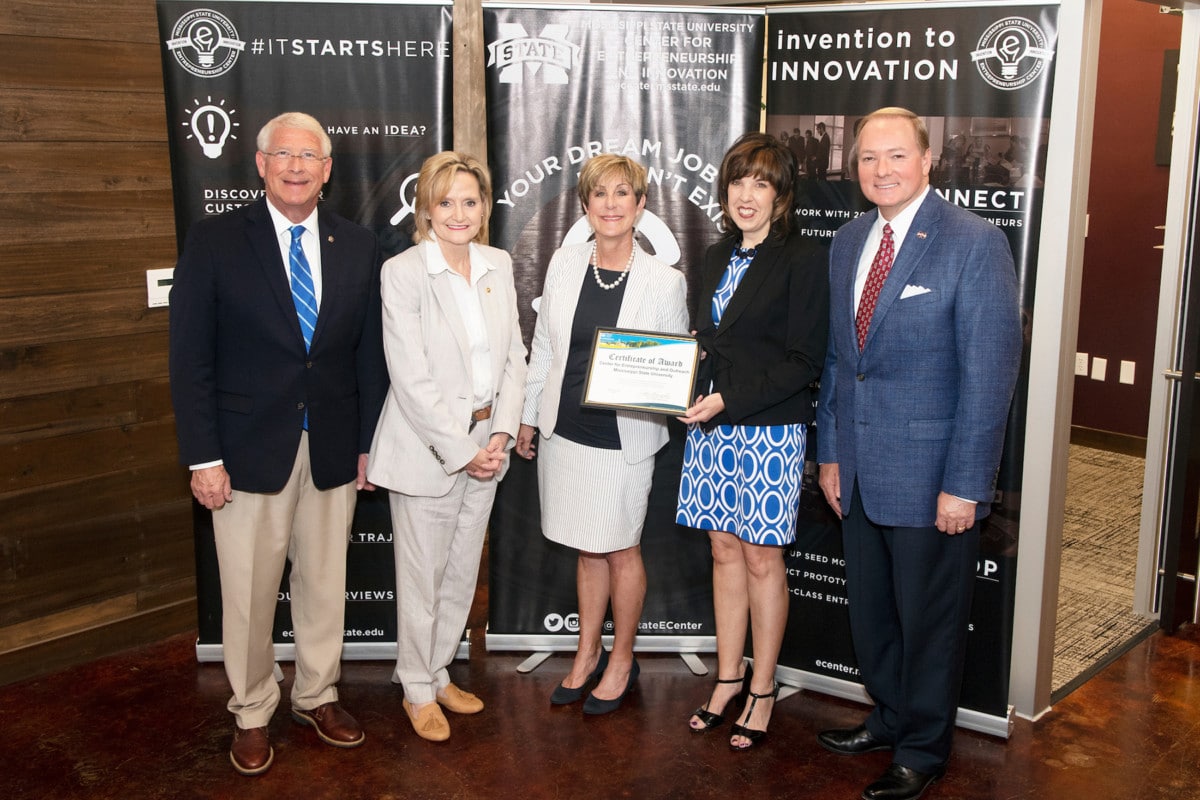Mississippi’s Senate delegation and top officials from the U.S. Department of Agriculture were at Mississippi State earlier this week to announce a $100,000 grant for the university’s Center for Entrepreneurship and Outreach to create a makerspace in Downtown Starkville.
Project leaders said the new makerspace will fill a critical need in providing prototyping capacity to area entrepreneurs. It will house equipment to help entrepreneurs with small and emerging businesses produce prototypes they need to get customer feedback and reach the marketplace.
USDA Assistant to the Secretary for Rural Development Anne Hazlett, as well as Sen. Cindy Hyde-Smith and Sen. Roger Wicker, were on hand for the USDA Rural Business Development Grant announcement. They spent the morning learning more about MSU’s efforts to bolster an entrepreneurial culture on campus and throughout Mississippi.
In addition to touring the College of Business center, they talked with MSU graduates who successfully launched a company while working through the Center for Entrepreneurship and Outreach business curriculum. The guests also joined MSU Extension leaders, business and agricultural economics faculty, and regional economic developers for a roundtable discussion on current business issues and resources.
Wicker said the grant award is a statement by USDA that MSU’s entrepreneurship center is “the sort of thing that we need to expand nationwide.”
“I think the grant is going to be a big help, but it wouldn’t have been awarded if there weren’t already so much success here. Our hats are off to the university for a center that’s already getting results,” Wicker said.
He added that aiding entrepreneurs is a good way to fight the “brain drain” in Mississippi.
“We educate some of the most talented minds, and they find it more attractive to go to Charlotte or New York City or some place out West. This is a good opportunity to keep them here in Mississippi,” Wicker said. “If we can solve that problem, it’s a quantum leap for our state.”
Hyde-Smith said, “There is opportunity to help so many students who have ideas and could easily become entrepreneurs. They just need the tools to foster all the components to make that a reality, and that’s what I have found here.”
MSU President Mark E. Keenum said the USDA Rural Business Development grant is expanding the successful efforts of the center to help more people translate their business ideas into commercially viable opportunities. Currently the CEO mentors about 100 student businesses every year.
“This will allow entrepreneurs to increase their chances of success,” Keenum said. He pointed out that the center is based in the College of Business but serves students and faculty from all colleges. Students working with the CEO represent 39 different university majors, and technology allows the university to offer mentorship to entrepreneurs throughout the state.
Hazlett said part of the core mission at USDA Rural Development is to increase rural prosperity through assistance such as the grant. She called the activities at the entrepreneurship center “very exciting” and “an example we would like to see others replicate.”
Known as the CEO, MSU’s Center for Entrepreneurship and Outreach already enjoys a strong Town and Gown relationship with the local community, with a new CEO office on Main Street opening last year. The new makerspace is a collaborative project that will be open to MSU students and faculty, as well as residents of the Golden Triangle. Its location at 114 E. Main Street in Starkville will be between Aspen Bay and Moe’s Original BBQ. It is projected to open within a matter of weeks.
“We take entrepreneurship very seriously in our college,” said Dean Sharon Oswald. “Entrepreneurship is really at the base of the culture in the College of Business. For us to be able to push that out—not only on campus to other colleges, but to the community as well—is very important. I think entrepreneurship is the future of Mississippi.”
CEO Director of Entrepreneurship Eric Hill said that over the past year, three MSU graduates who worked with the CEO created 10 full-time jobs in Starkville. MSU student entrepreneurs also have invested new businesses in different areas of the state.
Hill explained that the core of MSU’s entrepreneurship program is VentureCatalyst, a program launched in 2016 that combines training, funding and mentorship across a structured five-stage process starting from a business idea and developing into a funded company. He said VentureCatalyst specifically focuses on entrepreneurs developing scalable, innovation-based products or services.
Entrepreneurs creating new products face a major hurdle in developing prototypes substantiated enough to attract investor attention, Hill said. The grant will enable the new makerspace to include an array of advanced fabrication tooling, such as CNC routers, 3D printers, laser cutters and metalworking tools.
“Finding the right tools to build a proof-of-concept can be an insurmountable obstacle,” Hill said.
CEO Director of Outreach Jeffrey Rupp said the makerspace will provide the needed solutions to reach the next step in achieving success, and its community location reinforces alliances with entities such as the Greater Starkville Development Partnership.
“This dedicated makerspace serving the greater Starkville area will leverage current capabilities to provide advanced equipment, programming and an inspiring environment for MSU students and community members,” Rupp said.
For more about MSU’s Center for Entrepreneurship and Outreach, visit https://ecenter.msstate.edu/.




